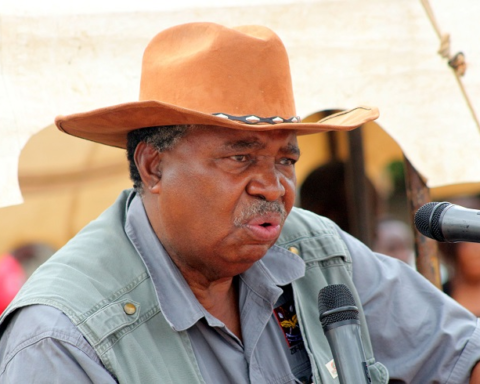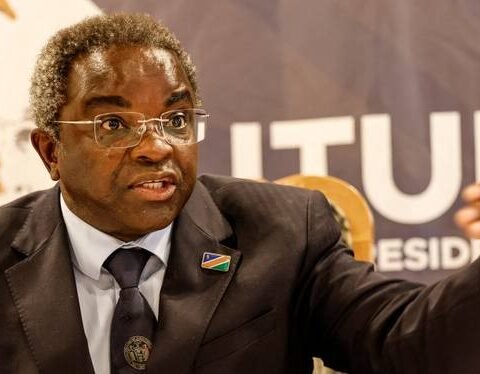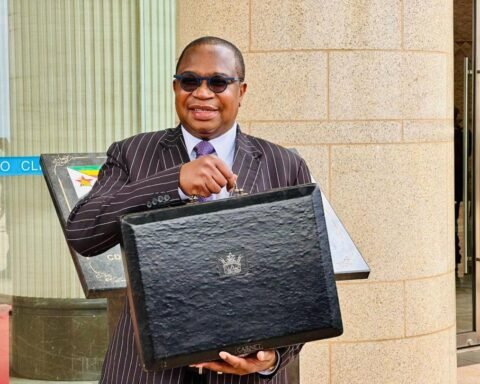The Minister of Health, Prof. Isaac Folorunso Adewole, has assured Nigerians and the international community that there is no cause for concern over President Muhammadu Buhari’s health.
He also said that the president could not be treated in Nigeria because of the long existing bond between him and his foreign doctors, saying health was a complex issue.
The minister’s remarks on the president’s health came just as a presidential spokesman, Garba Shehu, said Tuesday that Buhari would win another election overwhelmingly because “he had paid his dues”.
Buhari is currently in the United Kingdom seeking medical treatment for an undisclosed ailment.
His current trip is the third in the past year solely for medical reasons.
“One thing we must realise is that health is a complex issue. There’s what we call patient-doctor relationship; there is also a bond between the patient and the doctor and these are things we can’t play with,” the minister said in an exclusive interview with THISDAY in Abuja.
Adewole, who is a professor of surgery, added: “I used to have patients in Ibadan and they still call me, and say ‘we will like to see you’. Then I have to say no to them because I’m no longer available and ask, ‘why can’t you see somebody else?’ But many of them are reluctant to do so. That’s the complex thing about health.
“We should give him (Buhari) that choice. What we really wish is for Mr. President to be well and hearty.
“However, this is also a complex country, so I am not too happy about some of the insinuations, because we should pray for our leaders. We should continue to pray for him,” he canvassed.
Still addressing the concern among many Nigerians and the international community over the president’s continuing absence because of his health, the minister said: “There is no cause for alarm,” describing Buhari as an unusual man.
According to Adewole, “He (Buhari) came back and told us that he was ill and that he was treated. When we have that type of leader, I think we can go to sleep.”
Assessing the administration’s performance in the health sector, the minister scored the government very high.
He said the first thing is that the president assured Nigerians two years ago that health care would be accessible and available to Nigerians, adding that the country was on the path to achieving that.
The minister stated: “The first thing we have done is to approve the policy, that’s the third Health Policy in the history of Nigeria. So this government can take credit for putting a policy in place, that’s number one.
“We also launched a programme called the ‘Save One Million Lives Initiative’, where we took money from the World Bank and gave it to the states as seed grants to develop programmes that will impact on the lives of women and children because we want many of our indicators – maternal and child health indicators – to change. We don’t want our women to die as if they are chickens, that’s number two.
“We also initiated a programme called the ‘Rapid Response Results Initiative’, distinctively factored for the poor. We started with 10,000 surgeries for the poor and I am happy to say that all over the country, we are offering care to poor Nigerians.”
He also revealed that the federal government had developed a lot of policy documents – working on fistula, developed a policy to further the new born care programme, developed a policy for clorocydine, and working with pharmaceutical groups.
The drive on pharmaceutical groups, according to the minister, was targeted at ensuring that Nigerians patronise Made-in-Nigeria goods.
“Last year, I challenged local manufacturers to produce Made-in-Nigeria mosquito nets and they are out, which is also something that we should credit this administration with. So we are moving on day by day to make sure we fulfill our promises.
“We have started primary health care revitalisation, as part of the RRRI. Very soon, we are moving on to really injecting life into our tertiary centres. We have identified three reasons why people go out of the country and die: cancer, renal and cardiac diseases,” he said.
In the 2017 budget proposal, the minister explained that his ministry proposed a project called strategic investment in tertiary centres in seven centres, adding that when the work is completed, the seven centres would be fully equipped to handle cancer, renal and cardiac diseases in Nigeria.
‘Buhari Will Win Another Election’
However, despite the concerns over the president’s health, the security challenges and economic downturn in the country, the presidency has remained gung ho about Buhari’s chances at the polls, if an election was held today.
Speaking Tuesday at a joint press briefing in the Presidential Villa, Abuja to commemorate the second year of the administration, a presidential spokesman, Garba Shehu, said Buhari would win another election overwhelmingly because “he had paid his dues”.
The press conference was addressed by the three spokesmen in the presidency, Messrs Femi Adesina and Malam Garba Shehu and Laolu Akande.
Shehu, while answering questions on the plight of ordinary Nigerians, cited what he described as Buhari’s giant strides in the area of security which he said had been beneficial to the generality of the public.
Garba recalled the spate of incessant bomb blasts in Kaduna and Kano as well as bomb blasts in Abuja, which he said claimed hundreds of lives before the advent of the present administration.
He stressed that the event had now become history, adding that this was evidence of a performing government.
“Look, the ordinary Nigerian is the most important pillar for the Buhari administration. It is not the rich, and their confidence in the president has remained unshaken all this while.
“This thing we talk about, the whistle blower (policy), Nigerians have seen it and Nigerians are happy that monies that were stolen are being recovered.
“Look at what we used to have: Boko Haram was active in Abuja. In Kaduna, 20 Okada riders (commercial motorcyclists) were blown up in one day.
“These were ordinary people. Those who could buy protection for themselves, who could buy bulletproof cars for themselves, were not the targets of Boko Haram. It is you and I, ordinary people who went to church on Sundays that were blown up with bombs.
“In Kano, where I come from, we have one of the biggest markets in West Africa. People come from all over the region to buy and sell. They won’t come if there is no safety.
“But safety has been restored now. 300 people were blown up one day in the mosque. So, Buhari has paid his dues for Nigeria.
“If (an) election is held today, we will win. This administration will win resoundingly… There is happiness in the land,” Shehu said.
Speaking on the protracted violence perpetrated by herdsmen, Garba who said there would always be violence, submitted that the government was deploying all powers at its disposal to put paid to the menace.
However, he pointed out that the most effective approach to the handling of herdsmen/farmers’ clashes is the mutual engagement between the herdsmen and existing communities.
He also argued that the government played a laudable role in the rehabilitation of Niger Delta militants, 24 of whom he said obtained First Class degrees recently.
On the administration’s human rights record and refusal to obey court orders, Shehu said the former National Security Adviser (NSA), Col. Sambo Dasuki (rtd.), was still in detention despite court orders for his release because there are other charges against him.
Dasuki has been in the custody of the Department of State Services (DSS) since December 2015, despite orders for his release by three courts. He is facing separate charges of money laundering and illegal possession of firearms at a high court in Abuja.
Shehu said investigation into other allegations against the former NSA was still in progress, hence his detention.
Also, explaining why Ibrahim El-Zakzaky, leader of the Islamic Movement in Nigeria (IMN), was still in detention despite a court order for his release, the presidential spokesman said the reason was to forestall a breakdown of law and order, which his release might cause.
Playing with semantics, Shehu said that the cleric was in “protective custody” and not in detention.
“The government has a responsibility to ensure his safety,” he said.
“He is not in prison-type detention. He is in the company of his wife and children voluntarily.”
On his part, Adesina debunked the assertion that the ruling All Progressives Congress (APC) had failed in fulfilling its political obligations and promises to the electorate, in view of the hardship experienced by a cross section of Nigerians, maintaining that it was unfair to assess the performance of the Buhari administration in its first two years.
“People can always express their opinions, there is liberty to do that but you don’t have a scientific survey that has given you the percentage of people that believe that the APC has failed.
“The second point is that, when a government via a party is voted into office, it is voted for a four-year term under our own democratic arrangement.
“When you have spent two years, which is like a midterm, the first half of a game, you don’t then determine that it has succeeded or it has failed. You can be accused of being atomistic, using a small part to determine the whole. You can’t write the report card of this administration when it is just hitting the half way mark, that will not be fair.
“This administration will take Nigeria far beyond what we met it. So if anybody says APC has failed, just tell them it is too early in the day because it is a four-year term and this is just two years. You don’t reach definitive conclusions in two years,” he said.
Adesina also enumerated the administration’s achievements to include the N1.2 trillion capital budget released in 2016, the Central Bank of Nigeria’s (CBN) support for farmers to grow rice, the ease of doing business policy, the discovery of 20,000 ghost workers, effective whistle blowing campaign, and its macro-economic policies, among others.
He said there was a lot of improvement in governance since the advent of this government. “The situation between then and now is not the same. Things have changed tremendously. Let’s focus on the positive side,” Adesina pleaded.
He dismissed a news report that €2 million was paid to Boko Haram insurgents for the release of 82 Chibok girls on May 6, describing the report as fictitious, because it could not be found on the BBC website, which was credited with the story.
He also said Boko Haram insurgents no longer possess the strength they once had because the military has not lost its capacity to flush them out if they choose to regroup.
He added that the police have been sending their men to communities liberated by the military to secure such communities and forestall the resurgence of the insurgency in such communities.
Adesina also asked Nigerians to ignore media reports on a coup plot, saying it should not be stretched beyond what the military authorities had said.
According to him, what the Chief of Army Staff, Lt.-Gen. Tukur Burutai, said about the issue was a “routine warning to military officers”.
Adesina said: “The army has spoken and let us take that position. What the Chief of Army Staff said was a routine warning to military officers – don’t hobnob with politicians – and the army has explained the position.
“Let’s take that position and not stretch it beyond what the military has said because they are the ones that can give us the definitive position and they have spoken on it.”
On his part, Akande, while responding to a question on the fate of the committee set up by the Federal Executive Council (FEC) to interface between the executive and National Assembly, said there has been continuous interaction between the presidency and leadership of the National Assembly, insisting that both arms have a cordial relationship.
Akande also said besides the 200,000 jobs that were offered to unemployed graduates by the administration under the Social Investment Programme, soft loans would also be given to some Nigerians to pursue their private businesses at the end of the month.
He said with the government’s programmes in the agriculture sector, diversification of the economy and micro-credit schemes, among others, Nigeria would exit the recession this year.







